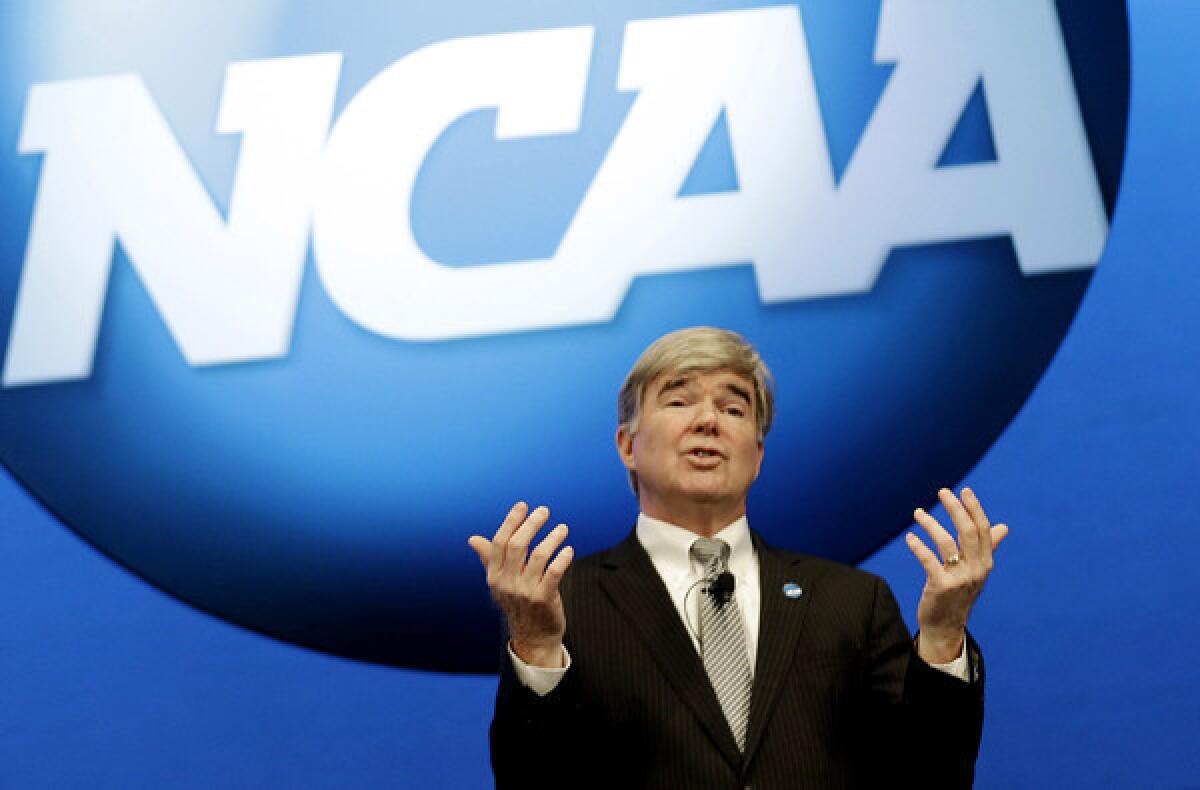After brouhaha over memorabilia sales, NCAA does right thing

It turns out the NCAA can do the right thing — and fast — if you just chase it far enough down a dead-end alley.
Mark Emmert, the organization’s embattled president, took swift action Thursday in the wobbly aftermath of Twitter-broken news the NCAA was selling, among other things, website merchandise of players currently under investigation.
“I certainly can understand how people can see that as hypocritical,” Emmert said on a conference call.
In a reversal move that would make Andre the Giant proud, Emmert said the NCAA would “exit” the business of using ShopNCAASports.com to hawk player memorabilia.
“I don’t think we should have been in that business,” Emmert said.
It was a brilliant public relations pivot by Emmert, even if it reminded you of the scene in “Casablanca” in which Capt. Renault is “shocked” by the revelation of gambling in the gambling establishment.
Emmert wouldn’t give it all up, claiming the NCAA was not profiting from the sales but only serving as a host aggregate for individual schools that presumably can continue the practice.
It just didn’t look good selling trinkets under the NCAA umbrella in the week in which it was learned the organization is investigating whether Texas A&M; quarterback Johnny Manziel exchanged his autograph for cash.
That would be a violation subject to immediate suspension.
Uncovering the NCAA sales practice was not like cracking the Da Vinci Code.
Credit goes to ESPN basketball analyst Jay Bilas, who simply typed “Johnny Manziel” into the NCAA’s search engine. Up popped Johnny Manziel’s No. 2 jersey.
The NCAA has long claimed jerseys are generic and don’t represent a particular player, but don’t miss Stanford retiring John Elway’s No. 7 jersey this fall during the Oregon game.
Also don’t miss the Ed O’Bannon licensing case dealing with the NCAA licensing players’ images, among other things.
Bilas started a tweeting frenzy that led to all sorts of interesting discoveries, namely that the NCAA was also selling merchandise for Reggie Bush and Penn State.
Charges against Bush landed USC on major probation and included an edict that the school disassociate from the former running back.
And it was Emmert himself who stiff-armed due process to hand down extraordinarily punitive punishment against Penn State in the Jerry Sandusky scandal.
Yet, as Dennis Dodd of CBS Sports noted, the ShopNCAASports.com website featured a Penn State video from the 2006 Orange Bowl, one of the 111 victories the school had to vacate.
“Indeed, the business of having the NCAA in those kinds of goods is a mistake,” Emmert said. “We’re going to exit that business immediately.”
Emmert said the site would still operate because there are still NCAA-specific items that can be sold. All the objectionable team materials, however, had been pulled by Thursday afternoon.
“Shop-gate” is just the latest mess the NCAA has had to face in a year of public-relations disasters.
Emmert has promised to expedite change within the NCAA as leaders such as Pac-12 Commissioner Larry Scott call for it to be more “nimble and flexible.”
It used to take the NCAA years to move on anything, so Thursday’s decision by Emmert deserves at least a smattering of applause.
Bilas asked on Twitter whether Emmert’s move was just a shell game.
“NCAA office out of sales of player jerseys,” Bilas tweeted. “But, members still sell ‘em while NCAA office clearly admits that it’s wrong. Yikes.”
Hey, you can’t just expect the NCAA to get sober overnight.
Don’t you have to slither before you crawl?
Progress is progress, even if the NCAA has to be shamed into it.
Twitter: @DufresneLATimes
More to Read
Go beyond the scoreboard
Get the latest on L.A.'s teams in the daily Sports Report newsletter.
You may occasionally receive promotional content from the Los Angeles Times.











